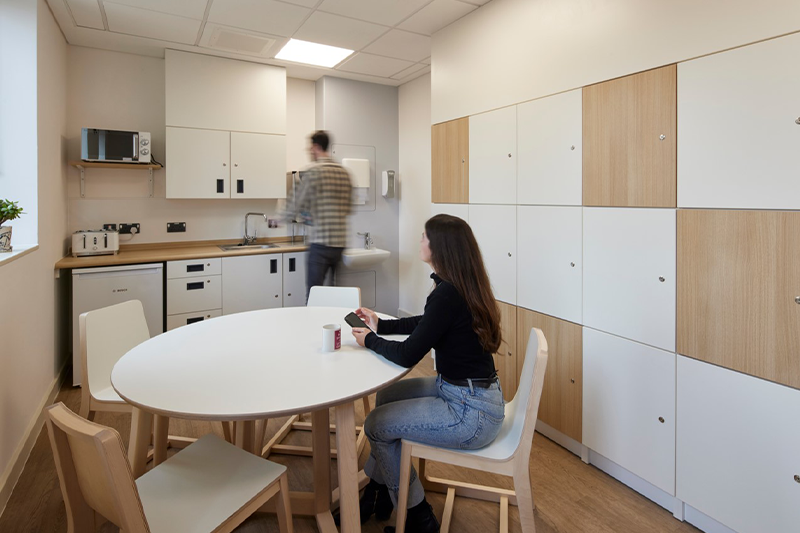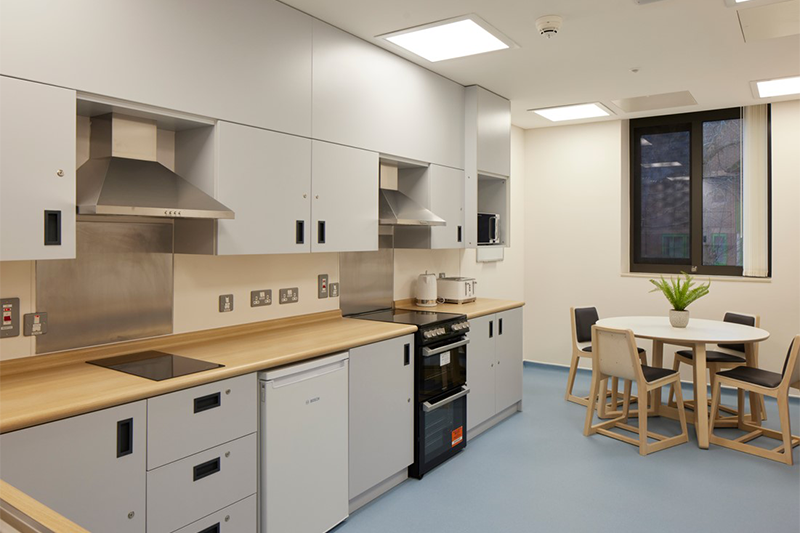Mental health facilities play a vital role in supporting individuals on their journey towards recovery, with spaces that need to be more than just functional. They need instead to foster a sense of calm, security, and well-being, and exceptional fitted furniture design emerges as a powerful tool in creating such therapeutic environments, writes Tony Huggins, managing director of David Bailey Furniture.
But how can robust fitted furniture be utilized to transform mental health wards into supportive and tranquil spaces? There is a simple answer, and research shows that when furniture is thoughtfully arranged, it helps to create designated areas for relaxation and socialization. This is the power of good design, helping to shape a therapeutic environment.
Even better, fitted furniture offers several advantages over traditional loose furniture. Mental health facilities often cater to individuals struggling with anxiety or feeling overwhelmed. Fitted furniture, with its defined spaces and built-in storage, creates a sense of order and predictability. Shelving and cabinets eliminate clutter, providing dedicated spaces for personal belongings and calming visual stimulation. This can significantly reduce feelings of stress and disorganization.
Safety is a paramount concern in any mental health facility, and because of this, fitted furniture can be designed to minimize sharp corners and edges, reducing potential hazards. Additionally, built-in features such as secure drawers and cabinets can prevent access to harmful objects. Furthermore, the inherent sturdiness of fitted furniture contributes to a sense of security and stability in the space.
For many practical reasons, mental health wards often face space constraints, which is why effective fitted furniture design allows for efficient space utilization. Walls and corners can be transformed into functional storage areas, maximizing available floor space. This creates a sense of spaciousness, which can be crucial for fostering a sense of calm and freedom of movement.

Promoting social interaction
Social interaction also plays a vital role in the recovery process, and fitted furniture can be designed to facilitate positive connections between patients. For instance, incorporating built-in seating areas around fitted units encourages comfortable and engaging conversations. Similarly, designated activity areas equipped with specific tables alongside storage solutions can promote group activities and shared experiences.
While consistency is important in a mental health facility, there’s room for allowing for individual expression. Fitted furniture can be designed with customizable features such as pinboards or display areas. This allows patients to personalize their space with artwork, photos, or inspirational quotes, creating a sense of ownership and comfort.
The materials used in fitted furniture also play a significant role in setting the tone of the space. Smooth finishes are easier to clean and maintain, contributing to a hygienic environment. These can complement soft furnishings like padded chairs and cushions for added comfort and a sense of warmth.
Colors also have a profound impact on mood and well-being, which is why companies like David Bailey Furniture incorporate calming color palettes into their range, with soft tones like blues, greens, and lavenders to promote a sense of tranquility. More dominant colors can be strategically used to create designated areas for specific activities. For example, a splash of warm yellow can designate a relaxation zone, while a cooler blue can define a space for active group therapy.
In such an environment, safety, of course, remains a top priority. This is why we incorporate features such as rounded corners on furniture to minimize the risk of injury and, as already mentioned, why we ensure that all cabinets and drawers have secure closures to prevent access to harmful objects. For patients with specific needs, fitted furniture designs can be further adapted to incorporate grab bars or lowered workstations.

Designing for specific needs
Because mental health facilities cater to a diverse population with such varying needs, fitted furniture can also be designed to address most specifications. It is possible, for example, to create vibrant and engaging spaces using color while maintaining a safe and secure environment. Built-in charging stations for electrical devices, dedicated areas for creative expression like art tables, and comfortable areas for group sessions and peer support can also be designed.
For mental health wards for geriatric patients, there is more of a focus on functionality and accessibility. Fitted furniture can be designed with features like lower countertops, grab bars for added support, and easy-to-open drawers and cabinets.
So, we can see that fitted furniture design presents a powerful tool for transforming mental health facilities into therapeutic havens. By prioritizing order, safety, space utilization, and opportunities for social interaction and personal expression, these thoughtfully designed spaces can significantly contribute to a patient’s well-being and recovery journey, providing a silent yet powerful support system to promote healing and foster a sense of hope for a brighter future.
For further information, visit www.davidbaileyfurniture.co.uk.
